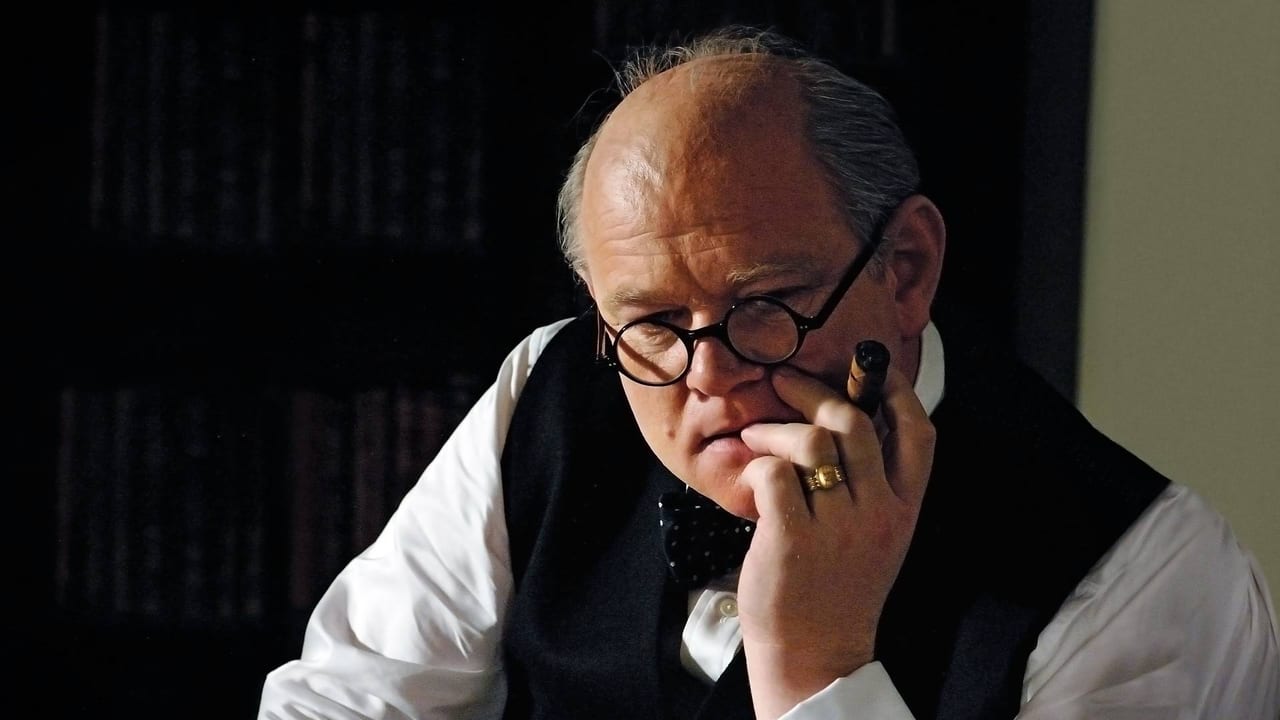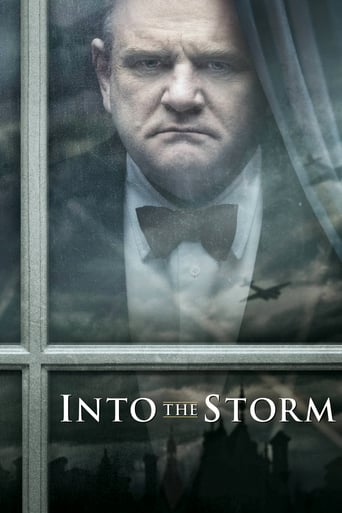

It is quite difficult for me to give a positive or negative vote to a film "Into the storm". So I will restrict myself to rought out the things I liked and those l didn't like. "Into the storm" is satisfactory film set in Great Britain during the second world war with Brendan Glieeson as a protagonist. In fact satisfactory is the best adjective to describe this film. I expected some more excitement and bustle from this fiml. However all things considered the scenes were tedious. I found Churchill's preoccupation with his speech to be particularly annoying. Moreover this movie was made in 2009. So the creators and main director Thaddeus O'Sullivan could have used some more primary document about this period in order to make "into the storm" more reliable from historical point of view. What about positive aspects, I liked the fact that protagonist reported real speeches of Winston Churchill. Also it is important to point out the relative imortance given to the wife of prime minister Clemmie interpreted by Janet McTeer. Her presence made this movie some more interesting. I really liked amazing performance of Brendon Glieeson. Even if he is Irish I think he managed to become real Churchill on scene. His sarcastic character gave some more vitality to the movie. Unfortunately this film does not provoke any particular emotion in the viewer . Sure enough there are not anything exceptionale but if you have a fancy for historical and biographical films it worths watching
... View MoreI'm not sure whether this was intended to be a sequel to "The Gathering Storm" - the 2002 docudrama that did a good job of documenting Winston Churchill's life up to the outbreak of World War II - but whether or not it was, it's an essential companion piece if you're interested in Churchill's life. This deals with the war years, although doesn't portray any warfare (except for a brief shot of Churchill watching newsreels about the D-Day landings.) The focus is very much on Churchill - on his state of mind, on his personality, on his hopes and fears, and - like the earlier movie - on his relationship with his wife Clementine. It's a fascinating portrayal. It's not exciting in a normal sense, but it's interesting.Brendan Gleeson was very good as Churchill. I didn't miss Albert Finney, who was in the earlier production. Janet McTeer did a good job as Clementine. Their relationship was interesting to watch - very loving and supportive, but clearly also tensions (Clementine isn't thrilled that her husband was Prime Minister and she doesn't like the way he treats the people around him.) The movie jumps a bit from scene to scene - probably inevitably. Some aspects of Churchill's war-time life are strangely left out. For example, there's little interest in his relationship with his generals or with US General Eisenhower. In fact the movie (with he and Clemmie vacationing in France as a backdrop - which causes some historical confusion for me which I'll relate in a moment) has as it's underlying theme Churchill's fear of losing the election that was called after Germany's surrender. This I found interesting (if it's accurate.) I've always wondered why Churchill lost. You'd think he would have won. If the movie is accurate, I can understand his loss much better; particularly in the light of the radio speech he's depicted making, in which he lashes out viciously at the Labour Party and accuses them of needing to establish a "Gestapo" to implement their policies. Not very diplomatic, and - as the movie points out - certainly not destined to win over those who might have leaned Labour but supported Churchill in appreciation for his war leadership and who were front and centre in the fight against Hitler and Nazism and the Gestapo. I don't know if that was an accurate depiction of what Churchill said about Labour during the campaign or not, but if it was it was a huge political mistake! Churchill was, of course, devastated by his defeat, but I thought the ending of the movie served as an appropriate tribute (whether historically accurate or not.) After leaving office, Churchill - quite bitter - reluctantly agrees to go to a play with Clementine. As the play ends, the star draws the audience's attention to the presence of "the man who saved our nation - Winston Churchill," to which the audience responds with a standing ovation and cheers of "bravo." Whether it happened or not, it should have happened! That would have served as a better tribute than Churchill's disappointing return to office in 1950.The historical confusion I have revolves around the French vacation. Churchill was at the Potsdam Conference in Germany (not on vacation in France) with Stalin and Truman when the election results were announced, but there was no reference to him being at the Potsdam Conference?In closing, I was quite taken with the performance (in a limited role) of Iain Glen as King George VI. He was very good, as were Len Cariou as Roosevelt and Aleksei Petrenko as Stalin.
... View MoreDo watch this if you enjoyed The Gathering Storm. There are obviously some differences because of the new cast.This movie shows behind the scenes details of Winston Churchill's life during WW2 and after. Don't expect a portrayal of England in WW2 or you will be slightly disappointed. Instead it is interesting to people who want to find out details of Chuchill's life and his reactions to specific events.Brendan Gleeson had a difficult task to fill Albert Finney's shoes. And he simply doesn't do as good a job. His physical appearance is further away from Churchill's and his mannerisms and voice aren't quite as good.Janet McTeer is a bit young looking for the role. But she is perfectly adequate.A bit of a let down as a war movie in its microscopic vision but then that is the point of it anyway. It's a biopioc and that's all.
... View More"Into the Storm" is one of those films where the lead actor Brendan Gleeson plays wartime Prime Minister Winston Churchill as though he is that man, but all that talent goes to waste because this film is nothing more than a white-wash of history. Evidentally the creators of this movie were more concerned about not offending anyone than with creating a film that was thought provocative, profound and even controversial. As a result, the plot and the characters simply go through the motions like in the propaganda war films from the 1940s. But you can also excuse the corny propaganda reels because they were a product of their own time. But one cannot excuse "Into the Storm" especially considering that it was made in 2009 when more primary documents about this period were available to the public.Indeed, in my humble view, this film would have been so much better if it remained faithful to the historical record instead of portraying the Second World War much in the same way as grandpa wanted to see it. The real Winston Churchill, for example, may have been a genius, but he had a very dark side which was completely overlooked in this movie. Churchill knew in April 1939 that Hitler would go to war to escape from the economic troubles that Germany was facing at that time. Moreover, Chamberlain and Roosevelt were in large part responsible for causing the Second World War. They worked together in implementing the Tripartite Stabilization Agreement, the Anglo-American Trade Agreement and other measures which had the effect of reducing German exports. Since the Germans could no longer earn foreign exchange (with which to buy foodstuffs and raw materials) by exporting goods abroad, Hitler faced a situation where he would either have to impose a tough austerity program that would have caused massive unemployment and starved his people or he would have to obtain his foodstuffs and raw materials through territorial conquest. He chose the latter course. But once again, "Into the Storm" makes no reference to that side of the story. If it did, then this movie would have been a lot more interesting.Finally, I object to the way Franklin D. Roosevelt was portrayed in this film by Len Cariou. Cariou seems to have got the impression that Roosevelt was a plain spoken honest man, when he was in fact the complete opposite. Roosevelt played mind games with his staff, his foreign allies and with his enemies. Moreover, he was the mastermind behind economic warfare against Germany. Once again, this film can take any approach to the material that it likes. But I submit that the reality of what happened is so much more interesting than any of the white-wash that this movie has to offer."Into the Storm" is not the worst movie I have seen. But it is pretty bad. It has no imagination, it does not have a whole lot of intelligence and the creators lack the independent mindedness to portray the past in a new and original way.
... View More